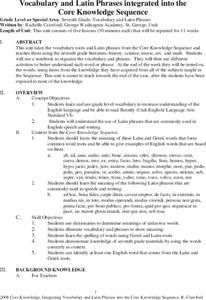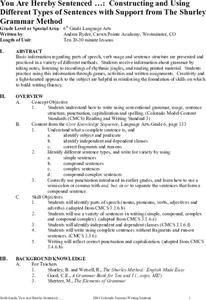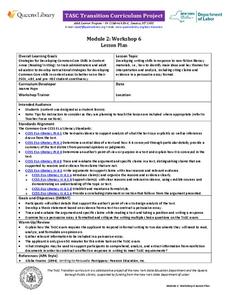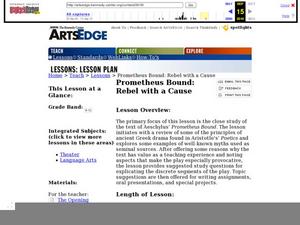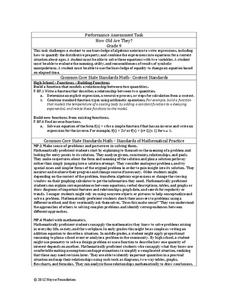Curated OER
Word Roots 1: Dict, Vent, Duct Advanced Fill-in-the-Blank
Choosing words from a provided list, learners use context clues to fill in each blank on this online, interactive vocabulary activity. Class members receive immediate feedback when they click submit. Consider this list as part of a unit...
Curated OER
Word Roots 5: NAT, TRACT, SEQU Intermediate Fill-in-the-Blanks
This is a straightforward vocabulary exercise in which learners fill in each blank in 12 sentences with a word from a word bank. The activity is somewhat unique because it connects word roots to the meaning of the words, giving learners...
Curated OER
Word Roots 1: DICT, VENT, DUCT Intermediate Level Synonym or Antonym Word Puzzle
Is your class struggling with synonyms and antonyms? This resource asks learners to identify a synonym and an antonym for six given words. There are various scaffolds in place for pupils including: a word bank, information on word roots,...
Curated OER
Word Roots 6: PLIC, FAC, COGN Advanced Level Synonym or Antonym Word Puzzle
Get your class to puzzle through antonyms, synonyms, and word roots with this online resource! Using a word bank, learners fill in an antonym and a synonym for six words. You could use this as a pre-assessment to see what your pupils...
Curated OER
Word Roots 4: GRAD, MOT, CAD Advanced Match 3
Access vocabulary knowledge with this online exercise. For this activity, learners match words to their definitions by choosing a letter from the drop-down menu provided for each word. This series of vocabulary exercises focuses in...
Curated OER
Word Roots 5: NAT, TRACT, SEQU Intermediate Level Synonym & Antonym
Decipher vocabulary using word roots. For this activity, learners fill in an antonym and synonym for six vocabulary words. They are provided with a word bank and can receive immediate online feedback. This could be used as an in-class...
Curated OER
As the Kids Come and Go: Mapping a Classroom
Map the classroom with your kids to help them understand how maps work and how to read them. The lesson starts off with a story about animals living and moving around the globe, and then kids create maps of their classroom to show how...
Curated OER
Vocabulary and Latin Phrases Integrated into the Core Knowledge Sequence
Students organize the vocabulary roots and Latin phrases from the Core Knowledge Sequence. In this word study lesson, students complete a 57 page packet of activities to increase the vocabulary base of Latin phrases.
Curated OER
News to the Core Reported by Very Special Students
Students create news articles that help them build their knowledge, skills, and academic confidence. In this special education lesson, students use previous knowledge to write a newsletter and demonstrate their understanding of various...
Curated OER
Common People of the American Revolution
Eleventh graders study the people of the American Revolution. In this American History lesson, 11th graders participate in a simulation that explains the different people of this time.
Curated OER
Conservation at a Crossroads Lesson 1: What Is Conservation and Why Does It Matter?
High schoolers explore the concept of conservation. In this conservation instructional activity, students read articles and primary documents about the Conservation Movement in the United States and compare the movement to today's...
Curated OER
Constructing and Using Different Types of Sentences with Support from The Shurley Grammar Method
Students analyze parts of speech, sentence structure, and ver usage in this ten lesson unit on grammar. Through games, activities, assignments, and printed material, the concepts are supported and reinforced in a creative way.
Curated OER
Demonstration Speech: How to Prepare to Give a Demonstration
Your class can practice public speaking by demonstrating an original recipe or how-to project. They must include images and speak for at least five to ten minutes. This is a very well outlined lesson that will be comprehensive for you...
Curated OER
Sentence Fragments
Complement your lesson on sentence structure with a sentence fragment handout. While it is not interactive, learners could use it as a reference to help identify sentence fragments as they edit their own work.
EngageNY
TASC Transition Curriculum: Workshop 6
Is a college education necessary for success in today's world? The class investigates the question, along with others at the end of the sixth workshop in a 15-part series. The lesson plan has four parts with multiple activities and...
New York State Education Department
TASC Transition Curriculum: Workshop 7
Designed specifically for math instructors, the seventh workshop of a 15-part series allows time to explore Webb's DOK, ponder open-ended questions, and create lessons to apply what is learned. Teachers craft high-quality math problems...
Curated OER
Prometheus Bound: Rebel with a Cause
If you are teaching Aeschylus' Prometheus Bound, you can't afford to miss this source. An extensive list of ideas outlines numerous discussion topics, writing prompts, comprehension questions, oral presentations, and projects. Have class...
Curated OER
"Shooting An Elephant": George Orwell's Essay on His Life in Burma
High school readers examine George Orwell's essay "Shooting an Elephant" for examples of symbolism, metaphor, connotation, and irony. They analyze how these literary tools convey the writer's main point and contribute to the persuasive...
PBS
Broadcast News
Just because a story is on the news doesn't mean it's being presented fairly. Analyze news broadcasts with a lesson focused on evaluating television journalism. At home, kids watch a news show and note the stories presented, including...
Mathematics Assessment Project
Solving Linear Equations in Two Variables
Solving problems about pen and paper with systems of equations ... or is it the other way around? In the lesson, learners first interpret expressions and use equations in two variables to solve problems about notebooks and pens. They...
Mathematics Assessment Project
Deducting Relationships: Floodlight Shadows
Try to figure out what happens with shadows as a person moves between two light sources. A formative assessment lesson has individuals work on an assessment task based on similar triangles, then groups them based on their assessment...
Curated OER
"Your Son, Your Only One" - The Sacrifice of Isaac as a Motif in Holocaust Poetry
Class groups examine a series of poems that use Abraham’s willingness to sacrifice Isaac as a motif in Holocaust poetry. Included are questions, notes to the teacher, and bibliographical information on each poem. The activities could be...
Statistics Education Web
Odd or Even? The Addition and Complement Principles of Probability
Odd or even—fifty-fifty chance? Pupils first conduct an experiment rolling a pair of dice to generate data in a probability instructional activity. It goes on to introduce mutually exclusive and non-mutually exclusive events, and how to...
Inside Mathematics
How Old Are They?
Here is a (great) lesson on using parentheses! The task requires the expression of ages using algebraic expressions, including the distributive property. Pupils use their expressions to determine the individual ages.









